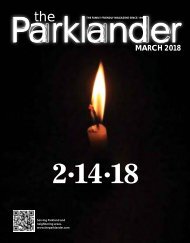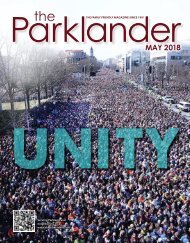dec2015
You also want an ePaper? Increase the reach of your titles
YUMPU automatically turns print PDFs into web optimized ePapers that Google loves.
HOLIDAY<br />
KWANZAA<br />
By David Volz<br />
Celebrating Family, Community, and Culture<br />
Kwanzaa is a celebration of the<br />
harvest and African-American<br />
culture. The holiday grew out of<br />
the social struggles that were taking<br />
place in the United States during<br />
the 1960s and focuses on the seven<br />
principles of African Heritage known<br />
as Nguzo Saba.<br />
The holiday will be celebrated on<br />
December 26 at the African American<br />
Research Library and Cultural Center,<br />
at 2650 NW 6 th Street in Fort Lauderdale,<br />
from 10am to 6pm, and Bass<br />
Park at 2750 NW 19 th Street in Fort<br />
Lauderdale on December 31. Kwanzaa<br />
officially begins on December 26 and<br />
runs through January 1.<br />
Kwanzaa is an important holiday for<br />
Nzingah Oniwosan, coordinator of the<br />
Kwanzaa event at the African-American<br />
Research Library and Cultural Center<br />
in Fort Lauderdale. “It is time for me to<br />
honor what my ancestors have been<br />
through and done and accomplished.<br />
It is a time for me to think about how<br />
I can have a positive effect on the<br />
world,” she said. “Kwanzaa is also an<br />
important opportunity for people not of<br />
African descent to learn about the history<br />
of Africans outside of slavery. I want us<br />
to move beyond looking at ourselves as<br />
former slaves.”<br />
Oniwosan has found that many people<br />
don’t know much about Kwanzaa. She<br />
conducts workshops on the holiday and<br />
its significance. The celebration at the<br />
library will include traditional Kwanzaa activities<br />
including the making of gifts such<br />
as jewelry and other handmade gifts. Also<br />
participants will participate in workshops<br />
on health and wellness, entrepreneurship,<br />
and the making of computer websites.<br />
The idea is to promote self-sufficiency.<br />
There will be performances that explore<br />
the seven principles of Kwanzaa.<br />
It is the time to honor<br />
the struggles and<br />
accomplishments of<br />
ancestors. Promoting<br />
self-sufficiency is<br />
the goal of one local<br />
celebration.<br />
“It is a home event and I have participated<br />
in many home events,” said Oniwosan.<br />
“We light candles and play a game that<br />
ties to Kwanzaa and ask questions about<br />
it. We have conversations and we may<br />
have a dance. It is a time to connect with<br />
family and friends. We may go to the<br />
beach to bring in the new year. We also<br />
discuss goals for the coming year.”<br />
Maulana Karenga is considered the<br />
founder of Kwanzaa in 1965 as an<br />
African-American holiday. He is a professor<br />
and chair of African Studies at<br />
California State University Long Beach.<br />
The name comes from the Swahili phrase<br />
matunda ya kwanza which means “first<br />
fruits of the harvest.” The seven principles<br />
consist of Kawaida, a Swahili word for<br />
tradition, and each of the seven days<br />
of Kwanzaa is dedicated to a principle.<br />
These include Umoja or Unity. This means<br />
people should strive for unity in the family<br />
and community. Kujichagulia means selfdetermination.<br />
People are to define themselves,<br />
create themselves, and speak for<br />
themselves. Ujima means collective and<br />
work responsibility. People are to build<br />
and maintain the community together<br />
and work together to solve problems.<br />
Ujamaa means cooperative economics.<br />
People are to<br />
build their own<br />
businesses and<br />
profit from them<br />
together. Nia<br />
means purpose.<br />
People are to<br />
work collectively<br />
to build their communities.<br />
Kuumba<br />
means creativity.<br />
People are<br />
to work to make<br />
the community<br />
more beautiful<br />
than it was in the<br />
past. Imani means faith. People are to<br />
believe with all their hearts in their parents,<br />
teachers, and leaders, according to the<br />
Kwanzaa website.<br />
Some of the Kwanzaa symbols include<br />
a decorative mats which represents<br />
tradition and a foundation. Crops<br />
represent African harvest celebrations<br />
and collective labor. There is a candle<br />
holder with seven candles representing<br />
the seven principles of Kwanzaa. The<br />
unity cup symbolizes the practice of<br />
unity which makes everything else possible.<br />
The gifts represent the labor and<br />
love of parents and the commitments<br />
made by the children, according to the<br />
Kwanzaa website. P<br />
30<br />
DECEMBER 2015


















